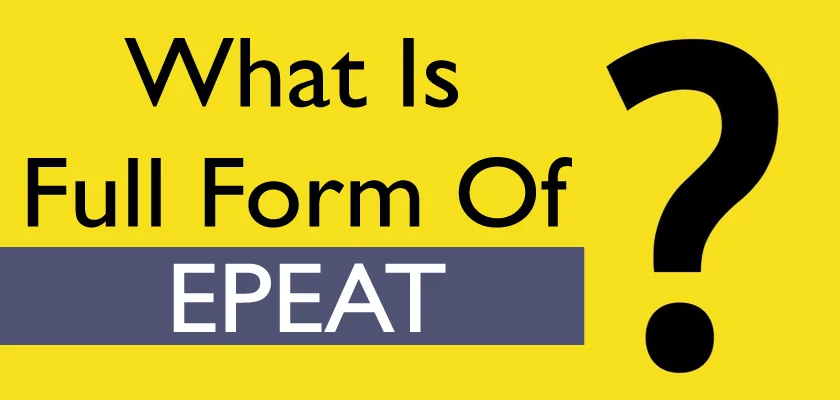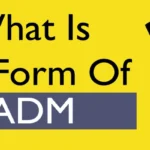Do you know what is the EPEAT Full Form? The full form of EPEAT is the Electronic Product Environmental Assessment Tool. It is a comprehensive rating system for electronics that measures their environmental impact. The program was created in 2006 to address the growing concerns about electronic waste and the impact of electronics on the environment.
Table of Contents
EPEAT evaluates products based on a variety of criteria, including their energy efficiency, recyclability, and use of hazardous materials. Products that meet certain standards are given a Bronze, Silver, or Gold rating. In this article, we will explore what EPEAT is all about and why it has become such an important tool for consumers and businesses alike.
What Is The EPEAT Full Form?
EPEAT Full Form – Electronic Product Environmental Assessment Tool
What is EPEAT?
As mentioned earlier, EPEAT stands for Electronic Product Environmental Assessment Tool. It is a rating system that evaluates electronic products based on their environmental impact. The program was developed by the Green Electronics Council (GEC), a non-profit organization dedicated to promoting sustainable electronics practices.
The goal of EPEAT is to encourage manufacturers to create more environmentally friendly products by providing them with incentives for doing so. By creating this rating system, consumers can make informed decisions when purchasing electronic products based on their environmental impact.
History of EPEAT
EPEAT was first launched in 2006 with support from the U.S. Environmental Protection Agency (EPA). The program was designed to establish a global standard for evaluating the environmental impact of electronic products.
Since then, many countries have adopted the EPEAT standard as part of their environmental policies. Today, over 50 countries recognize and use EPEAT as a means of ensuring that electronic products meet certain environmental standards.
Purpose of EPEAT
The purpose of EPEAT is twofold: to encourage manufacturers to create more environmentally friendly products and to help consumers make informed purchasing decisions.
By setting specific criteria for evaluating electronic products, EPEAT encourages manufacturers to consider factors such as energy efficiency and recyclability when designing new products. By doing so, they reduce their environmental impact while also helping consumers save money on energy bills.
At the same time, consumers benefit from having access to information about which electronic products are better for the environment than others. This enables them to make informed decisions when purchasing new devices.
Benefits of EPEAT
There are many benefits associated with using EPEAT-certified products. One of the primary benefits is that these products tend to be more energy efficient than non-certified ones. This means they consume less power and cost less money to operate over time.
Additionally, because these products are designed with sustainability in mind, they often contain fewer hazardous materials than non-certified ones. This makes them safer for both workers in manufacturing plants and end-users who come into contact with them during regular use or disposal.
Finally, because many governments now require government agencies or contractors to purchase only certified equipment under certain conditions relating primarily but not exclusively to IT procurement or green public procurement (GPP), companies producing certified equipment gain an advantage in selling it compared with companies producing uncertified equipment.
Criteria for Epeat Certification
To be certified under the Electronic Product Environmental Assessment Tool scheme (Epeat full form), three tiers exist: Bronze level certification requires meeting all required criteria plus at least 35 per cent optional criteria; Silver level certification requires meeting all required criteria plus at least 50 per cent optional criteria; Gold level certification requires meeting all required criteria plus at least 75 per cent optional criteria.
Some primary areas where considerable attention was paid while assessing include:
- Operational Performance: Criteria include Energy Efficiency Rating (Energy Star) and server performance per unit area, among others.
- Physical Design: Criteria include packaging materials, recyclability, dismantling information, and availability, among others.
- Material Selection: Criteria include Hazardous Substance Use Monitoring during the Manufacturing Process and mercury-free Displays, among others.
- End-of-Life Management: Criteria include restrictions on asset disposal via landfills and reusable or recyclable commodity-grade plastics, among others.
- Packaging: Criteria include minimum content requirements along with packaging material recyclability certifications, etc.
Global Recognition & Adoption Of EPEAT
Today, over 50 countries have recognized Epeat’s importance in promoting sustainable development practices through its product ratings across various industries, including automotive components like lithium-ion batteries as well as ICT equipment like laptops & mobile phones, thereby adopting it within their policy frameworks either voluntarily or legislatively depending on region-specific laws/regulations that may exist around the subject matter in question.
Future Developments in EPEAT
Efforts are ongoing across various industries towards achieving higher levels of sustainability through the integration of eco-design principles into product design processes, resulting in innovative offerings better aligned towards value propositions reflecting corporate social responsibility mandates entailing strict compliance adherence measures.

FAQs – What is the EPEAT Full Form?
What is EPEAT Full Form?
EPEAT stands for Electronic Product Environmental Assessment Tool. It is a program that helps purchasers evaluate and select electronic products based on their environmental performance.
What is the goal of EPEAT?
The goal of EPEAT is to promote sustainable electronics and reduce the environmental impact of electronic products by evaluating them based on a set of environmental criteria.
What kind of products are covered by EPEAT?
EPEAT covers a wide range of electronic products, including computers, laptops, tablets, printers, copiers, and displays.
Is EPEAT certification mandatory?
EPEAT certification is voluntary, but it is widely recognized and used by purchasers to identify environmentally preferable products.
What are the environmental criteria used by EPEAT?
The environmental criteria used by EPEAT include materials, energy conservation, end-of-life management, packaging, and corporate sustainability.
What does EPEAT stand for?
EPEAT stands for Electronic Product Environmental Assessment Tool.
What is EPEAT?
It’s a global rating system that helps identify electronics meeting specific environmental criteria. Purchasers can use EPEAT to compare products based on their environmental impact throughout their lifecycle, from materials extraction and manufacturing to energy use and end-of-life management.
Benefits of using EPEAT:
Promotes environmentally responsible purchasing: Helps identify electronics that minimize environmental impact throughout their lifecycle.
Reduces electronic waste: Encourages responsible design and manufacturing practices that minimize waste generation and facilitate effective recycling.
Saves energy: Promotes energy-efficient electronics, reducing greenhouse gas emissions and operational costs.
Improves public health: Encourages the use of electronics with fewer harmful materials, potentially reducing health risks associated with certain electronic components.
How can I find EPEAT-registered products?
You can search the EPEAT registry on the GEC website: https://www.epeat.net/
What are the different EPEAT rating levels?
EPEAT uses a tiered rating system (Bronze, Silver, Gold) based on the level of environmental criteria met by a product.
What should I consider when choosing an EPEAT-registered product?
While EPEAT provides a valuable starting point, consider other factors like product performance, functionality, and cost to make a well-informed purchasing decision.
Is EPEAT mandatory?
EPEAT is not mandatory in most countries, but some government agencies and organizations may require or encourage the purchase of EPEAT-registered products.
What are some criticisms of EPEAT?
Some criticisms include potential limitations in addressing the full environmental impact of electronics and concerns regarding the transparency and comprehensiveness of the criteria.
Are there alternative eco-labels for electronics?
Yes, there are other eco-labels with varying scopes and focuses. EPEAT primarily focuses on environmental performance over the product lifecycle, while others may focus on specific aspects like energy efficiency or recycled content.
Thanks for reading. What is the EPEAT Full Form? Bookmark our website Whatisfullform.com. To know more, read our collection of full forms.


